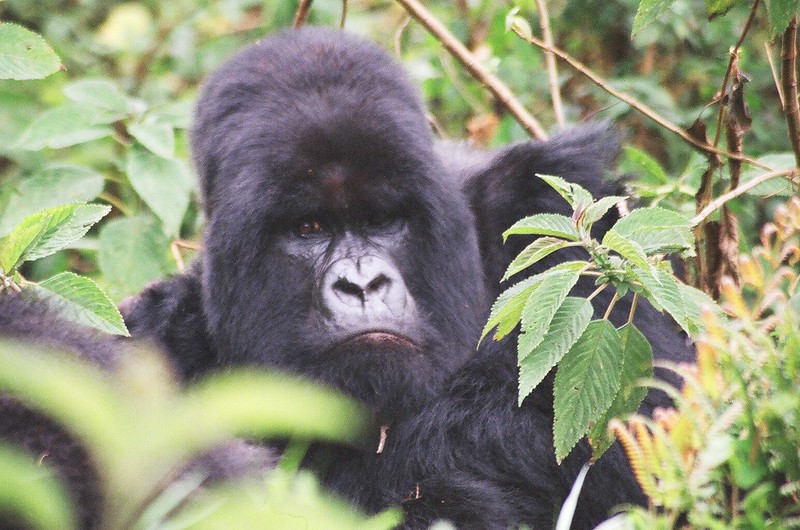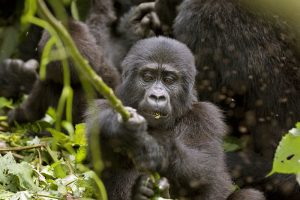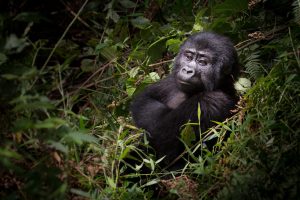What to do when a gorilla charges at you.
In the heart of the African rainforests, where the air is thick with the melodies of nature, encountering a gorilla in the wild is a rare privilege. Abunda Discoveries Uganda invites you to embark on a journey into the realm of responsible gorilla trekking, shedding light on what to do when a gorilla. With insights from seasoned guides and conservation experts, discover the best practices to ensure a safe and enriching experience amidst these majestic beings.
Stay Calm and Avoid Eye Contact:
In the event of a gorilla charging, it’s crucial to remain calm. What to do when a gorilla charges at you. Avoid direct eye contact, as this can be perceived as a threat or challenge. Maintain a calm demeanor and lower your gaze, signaling that you are not a threat to the gorilla.
Stand Your Ground:
While the instinct to flee may be strong, it’s essential to stand your ground. Sudden movements or attempts to run can escalate the situation and trigger a chase. Hold your position and keep a respectful distance, allowing the gorilla to assess that you pose no threat.
Speak Softly and Crouch:
In a calm and reassuring tone, speak softly to the gorilla. This can help convey a sense of non-aggression and may soothe the animal. Additionally, consider crouching down to appear less intimidating and to emphasize that you are not a threat.
Avoid Direct Confrontation:
Make yourself appear smaller by avoiding direct confrontation. If the charging gorilla is a silverback, the dominant male in the group, it’s essential to give him space and avoid any actions that may be perceived as challenging his authority.
Back Away Slowly:
If the gorilla continues to charge or shows signs of agitation, back away slowly without turning your back on the animal. Maintain a respectful distance and provide the gorilla with the space it needs to feel secure.
Follow Guide’s Instructions:
Gorilla trekking experiences are guided by experienced professionals who are well-versed in gorilla behavior. Pay close attention to your guide’s instructions and follow their lead. They are trained to interpret gorilla signals and ensure the safety of both visitors about what to do when a gorilla charges at youand the gorillas.
General health rules
Remember that mountain gorillas are very susceptible to human diseases. The following rules are ways to minimize the risk your visit might pose to them. Respect the limits imposed on the number of visitors allowed with the gorillas each day. This minimizes the risk of disease transmission and stress to the group. The assigned UWA guides shall ensure the social distancing of 2 meters among the tourists while tracking, where practical.
If you are feeling ill or carrying a contagious disease, please stay at your boarding facility. An alternate visit will be arranged for you, or ask your safari manager to process a refund. Tourists, staff, and porters who, during the briefing, are observed to be sick shall not be allowed to track. These include anyone with signs of flu and those who report having diarrhoea, stomach upsets and malaria, among others.
If you feel the urge to cough or sneeze when you are near the gorillas, please turn your head away and cover your nose and mouth to minimise the spread of bacteria or viruses.
Always stay 10 meters (32 feet) away from the gorillas. It’s to protect them from catching human diseases.
Do not leave any rubbish (e.g. food wrappers) in the park; foreign items can harbour diseases or other contaminants.
If you need to go to the toilet while in the forest, please ask the guide to dig you a hole with his panga. Make sure the hole is 30 cm deep, and fill it in when you are finished.
In case a tourist or accompanying members of the team experience a health-related problem, UWA staff shall apply the established evacuation and first aid guidelines to move the affected individual from the field.
Stay in a Group:
Gorillas are more likely to perceive a group of individuals as non-threatening. Stay close to your trekking group and avoid separating from the pack. A cohesive group presents a less intimidating presence to the gorillas.
Be Prepared to React:
While gorilla charges are rare, it’s essential to be prepared to react calmly and responsibly if such a situation arises. Familiarize yourself with the appropriate responses, as guided by your experienced trekking guide, to mitigate any potential risks.
Observe and Respect Signs of Agitation:
Pay attention to the gorilla’s body language and vocalizations. Signs of agitation may include vocal displays, chest-beating, or aggressive postures. Respect these signals and adjust your behavior accordingly to ensure a harmonious encounter.
Reflect on Responsible Trekking Practices:
Responsible gorilla trekking prioritizes the well-being of both humans and gorillas. Reflect on the importance of adhering to guidelines and regulations established for gorilla conservation. By practicing responsible trekking, you contribute to the protection of these incredible beings and their natural habitats.
Conclusion:
As stewards of responsible tourism, Abunda Discoveries Uganda emphasizes the importance of understanding and respecting gorilla behavior during trekking experiences. By staying calm, following expert guidance, and prioritizing the well-being of both visitors and gorillas, you can transform a potentially challenging encounter into a moment of awe and appreciation for the majesty of these remarkable creatures. May your gorilla trekking adventure be marked by responsible practices, unforgettable moments, and a deep connection with the natural world.




